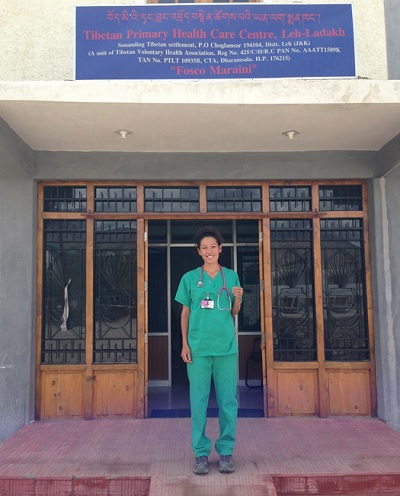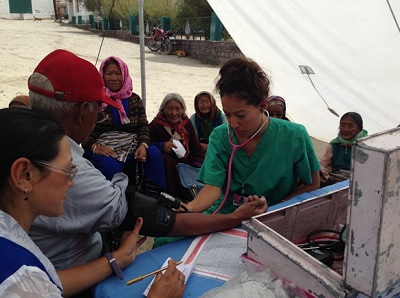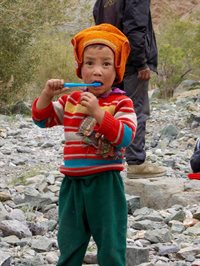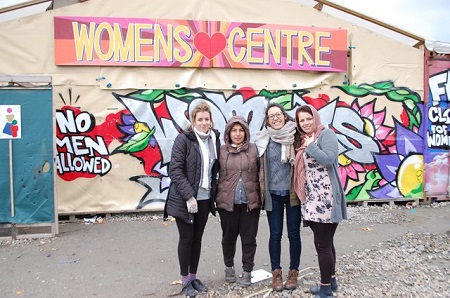Education and dignity through underwear
Currently in her fourth year at the GKT School of Medical Education, Yasmin Milner has been nominated for the Dr Abbas Khan Medal for her outstanding contribution to humanitarian work.

The Dr Abbas Khan Medal was established in 2015 to provide a lasting tribute to the extraordinary humanitarian contribution of alumnus Dr Abbas Khan. Dr Khan graduated in medicine from King’s in 2006 and went on to become an orthopaedic surgeon. He tragically passed away in 2013 after he was detained for undertaking humanitarian work in Syria.
Yasmin is nominated for her humanitarian contributions across London and aboard over the past 10 years.
Speaking of her first international volunteering role over 10 years ago, Yasmin went to Venezuela as a teaching assistant to help teach English:
I was 17 years old when I went to Venezuela and the organization I was working with provided teachers and teaching assistants (me!) to a rural school in the rainforest along the Brazilian border. This was home to various groups of indigenous peoples and the tribe I stayed with were the Pemon tribe. Living there without running water or electricity, I reflected on the life I was born into in London and the circumstances that had brought me to Venezuela. What struck me the most was that even though our worlds in a physical and environmental sense were almost exactly the opposite, the girls there were the same age as me and enjoyed just the same things: playing with each other’s hair, gossiping over snacks and taking care of their families.
It was the first time I came to really appreciate that humanity, in its purest form, always has the ability to be kind, honest and loving. Ultimately we all share the same morals and values and everyone and anyone is an equal.

Yasmin has since taught English in an orphanage in Nepal; volunteered with HIV services in rural Botswana; trekked the Indian Himalayas giving medical care to rural communities otherwise inaccessible; volunteered in homeless outreach services and soup kitchens; and run workshops for teenagers to raise awareness of mental health issues with non-for-profit social enterprise ‘Open Minds’.
 Volunteering with HIV outreach community services in Botswana came just after she had decided to study medicine and despite her limited medical skill-set, she relished the opportunity to talk with women and adolescents about such a stigmatized and psychologically demanding chronic condition.
Volunteering with HIV outreach community services in Botswana came just after she had decided to study medicine and despite her limited medical skill-set, she relished the opportunity to talk with women and adolescents about such a stigmatized and psychologically demanding chronic condition.
Being in Botswana, I realised the challenges faced on the frontline of the HIV epidemic. The struggle of assisting on wards with a high daily death toll from AIDs combined with the outreach efforts to promote safer sexual behavior, raise awareness and teach communities sometimes left you feeling completely disillusioned. But what always remains are the success stories, those individuals nursed back to health such as an effective course of post-exposure prophylaxis and maternity supervision that prevents a mother-to-baby transmission.
Last year Yasmin volunteered at the Dunkirk refugee camp, France’s first and only internationally recognised refugee camp. Speaking of her time at the camp, she was shocked by the resilience of the people:
The majority of refugees in the camp are teenage boys and young men and we found them very friendly. As a trio of students in our mid-twenties we were amazed to find that our new friends were just like us. One was a software engineer, another a veterinary surgeon, another spoke five languages. We shared cups of warm, sweet tea with them, laughing and joking, teasing one another just like our friends back home. But after every laugh, I would look at their face and listened as they told me about the life they led back home, the friends they grew up with, and the family they had lost.
What struck me the most was their resilience, their camaraderie. I found it ironic that they so literally embodied the national motto of France—Liberte, Egalite and Fraternite. Despite being free within a prison of our making, they showed a sense of equality and fraternity that I have never before seen. I couldn’t help but ask myself, Would I be that resilient in the face of such adversity? We could do well to learn how to foster such dignity, respect and community.
While speaking with the women in the camp they identified issues with poor hygiene and sanitation of chronic vaginal candidiasis.

We learnt that almost all the women in the camp were suffering from vaginal thrush, she said.
They expressed gratitude at being the recipient of donations, but explained that between the use of second-hand underwear and the difficulty washing in breezy, portable shower cabins, thrush was now an everyday reality. An everyday ‘luxury’ that we so often take for granted is that our underwear is just ours. Not donated, not stained, not second hand.
Vaginal thrush, an itchy, painful and potentially damaging condition is caused by many things including poor hygiene, stress and nutritional deficiency. Left untreated, it can lead to chronic infection, problems in pregnancy and even miscarriage. As well as being transmissible to men. Whilst the condition itself requires treatment, the ability to put on clean, dry underwear would relieve the pain, discomfort and minimize the risk of re-infection.
Understanding the legal constraints of providing medical care, Yasmin and a co-founder set up the Knickers for Dunkirk to raise awareness of the issue and nurture a sense of compassion and dignity. The Knickers for Dunkirk campaign raised £2,500 within a month which provided a pack of five fresh pairs of underwear to each of the 150 women in the camp. With the additional funds, the campaign also purchased a pair of tracksuit bottom trousers for each woman.
Her efforts have been recognised through her local MP, Catherine West who tweeted about the Knickers for Dunkirk initiative and by London Live TV who aired a live interview with Yasmin and her co-founder. They plan on extending their operations to other camps and communities of women in need both in the UK and across Europe who have been displaced during the migrant crisis.
Speaking of her nomination for the Dr Abbas Khan Medal, Yasmin is deeply honoured:
I am deeply honoured to be nominated for the award, and to even be considered alongside the other nominees - and their unbelievable work is an honour in itself. Students like them, and Dr Khan himself, inspire me to continue striving for a better, fairer, more compassionate society. In times such as these, it is important to look within our communities for people like them who set an example of how being a human kind, is actually, just about being kind.
Yasmin is one of four nominees for the 2016 Dr Abbas Khan Medal. The winner will be named at the Award Ceremony on 6 February 2017. MBBS staff, students and alumni are invited for what promises to be an inspiring night. More information and to RSVP visit the Dr Abbas Khan Medal page.